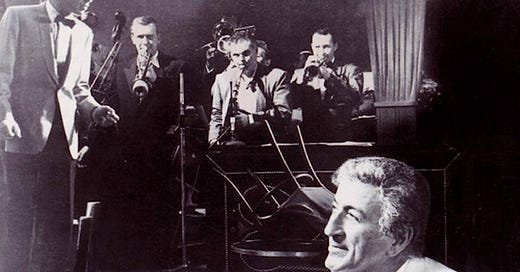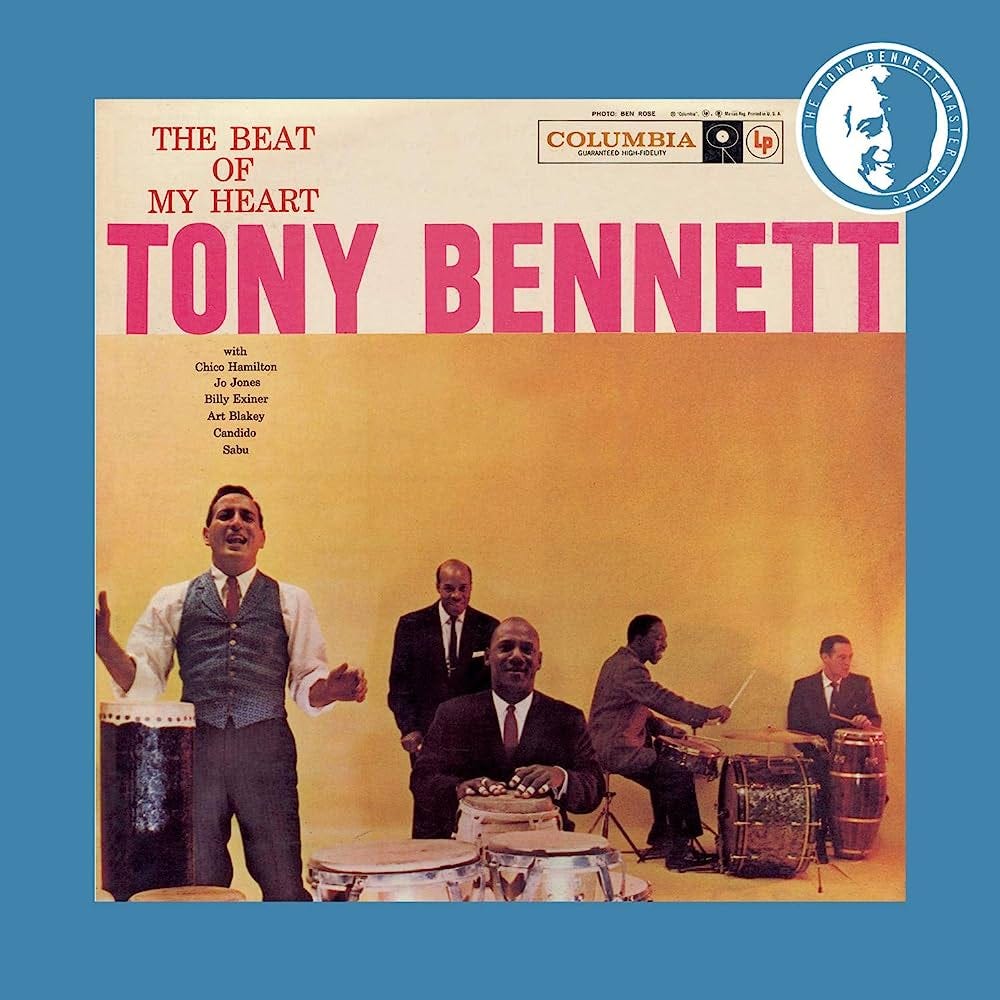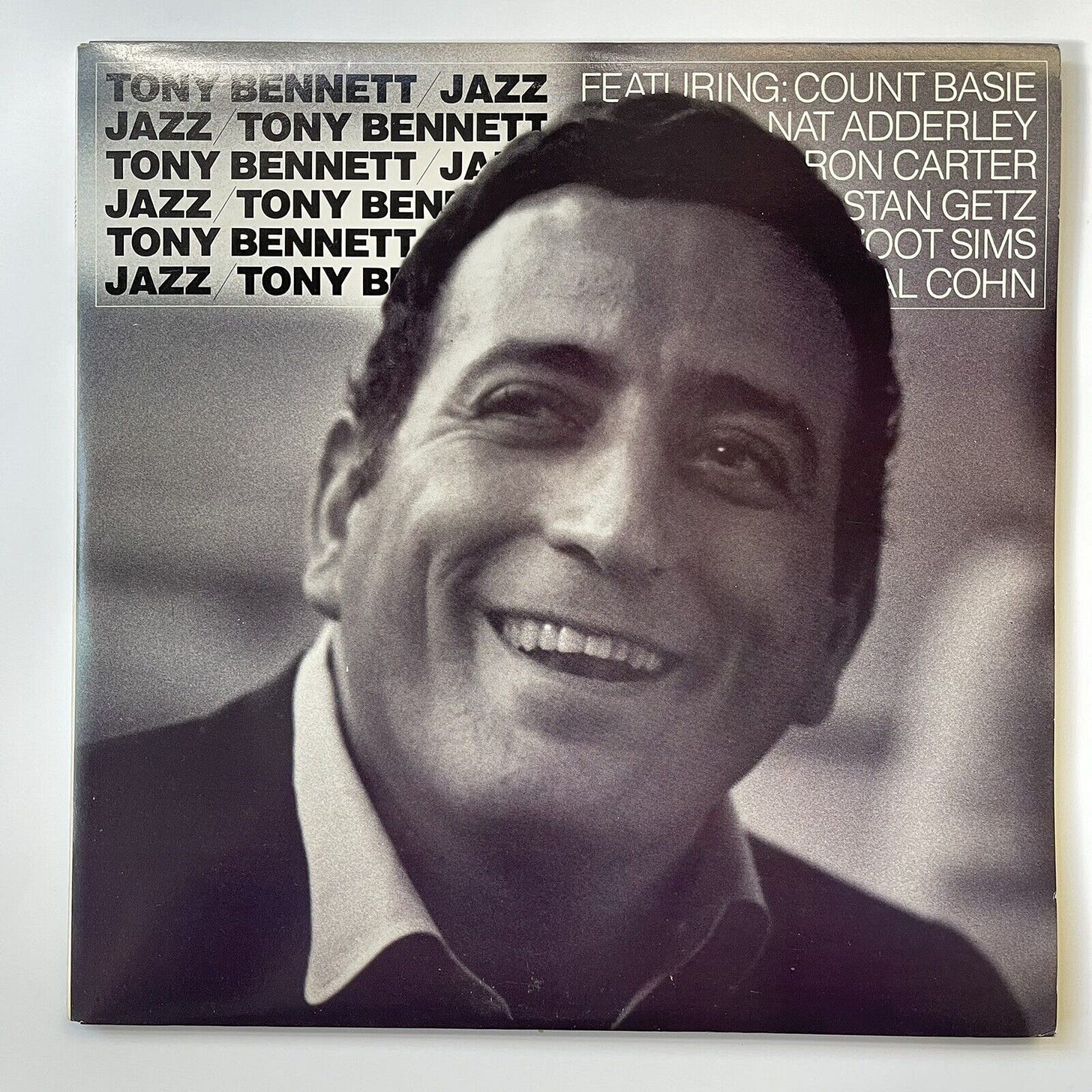Let's Begin: Tony Bennett and Jazz Drummers
The legendary singer recorded with Art Blakey, Elvin Jones, Joe LaBarbera, Clayton Cameron, Kenny Washington....
Like all of us, I was saddened by the news on Friday of Bennett’s passing, but glad for Bennett’s long and rich life. He left us plenty of music to study and enjoy.
Tony Bennett was a treasure. In addition to his world-famous gift as a vocalist and communicator, he had an unexpected affinity with jazz drummers, humbling himself enough to meet them, musically, halfway between his world and theirs.
For some wonderfully in-depth and considered writing on Tony Bennett, see Ted Gioia and Nate Chinen, while Mark Stryker’s Twitter thread is an essential playlist with helpful commentary. Ethan Iverson’s essay has great comments on select Bennett recordings and a candid eyewitness account of Bennett in rehearsal.
Unlike these writers, I had no close encounter with Bennett personally. But his music was a part of family life. Perfectly Frank, Bennett’s 1994 Sinatra-themed release and a key part of his late-career revival, was often played at my house; my grandfather knew the words to practically every song.
It got through to me too. Perfectly Frank was the first album of standards by a vocalist that I genuinely loved, and was the Bennett I reached for when I heard the new of his death.
Part of my attraction to the album was the presence of drummer Joe LaBarbera. Maybe most well-known as the final drummer in the Bill Evans Trio, LaBarbera has been an unwavering presence in the music since Evans’ passing 43 years ago. That’s LaBarbera on the Rachael and Vilray album I Love A Love Song on Nonesuch.
On Perfectly Frank, LaBarbera brings the same swing and energy to Bennett and Ralph Sharon that he did to Evans and Tom Harrell in 1979. Check out LaBarbera’s duos with Bennett on “The Lady Is A Tramp”, a fast, wild “Day In, Day Out”, his heavy barroom beat on “One For My Baby”, and oodles of tasty brushes and perfect tempos throughout. This is outstanding song drumming. Give it up for Joe LaBarbera.
In 1993 or ‘94 I was in the audience at SPAC in Saratoga, NY for a Bennett set. I remember the tempos, the audience’s love for Bennett, and the graceful way he accepted and sent back that love. This was a special guy.
Clayton Cameron was Bennett’s drummer at the time; his drum solo was a big moment that night. Cameron is featured on “It Don’t Mean A Thing If It Ain’t Got That Swing” on Tony’s MTV Unplugged concert (taped six months after and at the same studio as the legendary Nirvana set). At the time, Clayton was making waves as a brush specialist, eventually releasing an instructional video entitled The Living Art Of Brushes.
Cameron has an old-school entertainers’ charm and complete command of his instrument. His solo on “It Don’t Mean A Thing” engages the audience, has a clear, concise arc, and leaves a strong impression. Cameron recorded with Bennett into the 2010s, and remains active in L.A., where he has since played with Kenny Burrell and the Count Basie Orchestra.
Kudos to Clayton Cameron, spreading wisdom and skill, swinging musically during Tony Bennett’s career ascent.
Drummer Kenny Washington has made an enormous contribution since the early Eighties. Mark Stryker’s great piece on Kenny and bassist Peter Washington from JazzTimes is essential (I don’t know if this link will work, but try it anyway). I hope to chronicle some of Kenny’s work in the future.
Stryker rightly lights on Bennett’s The Silver Lining: The Music Of Jerome Kern (Columbia, 2015) as a place to hear what Washington does best. Equally noticeable is how at ease octogenarian Bennett fits in with the long-standing Bill Charlap Trio, one of the great groups in jazz.
Bennett floats above Washington’s graceful 3/4 on “I Won’t Dance”, while on “Dearly Beloved” he sits right in the middle of Kenny’s beat. On “Nobody Else But Me”, Washington and Bennett lean into each other and generate some old-fashioned heat.
As Mr. Stryker correctly says “There is nothing old-fashioned about the Washingtons. They aren’t journeymen either. They are state of the art.” Amen.
One of the reasons Bennett was so comfortable with Joe LaBarbera, Clayton Cameron, and Kenny Washington is that Bennett’s history with great drummers is much longer than I knew. Bennett’s 1957 Columbia album The Beat Of My Heart features Chico Hamilton, Billy Exiner (best known for playing with Claude Thornhill when Gil Evans was arranging for them and Lee Konitz was in the sax section), Candido Camaro, Sabu Martinez, and Art Blakey. The four tunes Bennett and Blakey recorded are standouts, streaming now on all the major services. The tunes are:
“Let’s Begin”
“Just One Of Those Things”
“I Get A Kick Out Of You”
“You Go To My Head”
Beyond the novelty of hearing Bennett’s voice and Blakey’s drums in duet (each arrangement save “You Go To My Head” calls for voice/drum duets), I was stunned at how uniformly great the music is. But I shouldn’t have been surprised.
Art Blakey was a consummate professional and, in the music, a humble genius. With Tony Bennett, Blakey could easily play his licks, swing the band, hook up the arrangement, and be himself.
It’s not that each tune is a revelation for Blakey fans or Bennett aficionados— the point is how well the combination works, how naturally Blakey and Bennett connect.
On May 25, 1964, Tony Bennett guested on trombonist/composer Bob Brookmeyer’s session with tenor saxophonist Stan Getz, pianist Herbie Hancock, bassist Ron Carter, and drummer Elvin Jones. That day, Bennett recorded a beautiful version of “Danny Boy”, which features neither Brookmeyer nor Elvin Jones. Then, on May 26, he recorded the Strayhorn masterpiece “Day Dream”, with the full band, including Brookmeyer and Jones. This beautiful track was released on Bob Brookmeyer and Friends (Columbia, 1964).
But Bennett went further. In October 1964, Bennett, Getz, Hancock, Carter, and Jones met in the studio for three tunes, eventually released on a 1987 Bennett Columbia compilation called, simply, Jazz.
“Out Of This World”
“Just Friends”
“Have You Met Miss Jones?”
This sort of world-colliding mashup would become more common in the Hal Willner era, but in 1964 must have been radical1. All respect to Bennett, Getz, Hancock, Carter, and Jones.
1964 was a banner year for Elvin, the year he recorded both Crescent and A Love Supreme with John Coltrane, the first three Wayne Shorter Blue Note albums, and so much more2.
Like the earlier Bennett sessions with Blakey and Jo Jones, these tracks are important not for a standout Jones or Bennett performance per se, but because they highlight how easily they connect, how porous the boundaries between pop and jazz really are. It’s too bad a full LP didn’t result, but I’m glad for these three tunes.
On “Out Of This World”, Elvin is fleet and light, sounding almost like Roy Haynes for a few bars of the melody. Some tell-tale bass drum accents underneath Getz give him away. There’s just a hint of professional tentativeness from everyone, I’ll admit, but we’re off to a great start regardless.
Bennett delivers “Just Friends” as only he can, with every nuance of the melody and lyric perfectly communicated. Elvin is inspired, and everyone sounds more relaxed. Jones’s ballad playing here, as always, is highly detailed— put on some headphones and notice his cascade of accents on the snare drum, soft swats at the cymbal, and pianissimo hi-hat splashes. There’s a big feeling on this track; the session is coming together. Hancock’s accompaniment is a complete statement.
On “Have You Met Miss Jones?”, Mister Jones sets a perfect tempo. Bennett is in command, Elvin picks up some sticks, and he swings out for a half-chorus with Getz. At the bridge, Bennett enters, and we briefly hear all five musicians together— Tony Bennett swinging with the quartet.
Tony Bennett demonstrated real humility in collaborating with Elvin Jones and Co. in 1964, finding a way to make music together, bridging different traditions and distant eras. In a way, these three tracks are harbingers of the Hal Willner-produced tribute albums and the widely practiced mash-up style of Eighties NYC music. I’m impressed that they went for it.
Three cheers for Elvin Jones in 1964, effortlessly making music with John Coltrane, Wayne Shorter, Stan Getz, and Tony Bennett!
Tony Bennett did not see himself as a jazz singer, but rather as a singer who liked jazz. This understanding of himself, of his limitations and strengths, seems, paradoxically, to have let him connect with jazz musicians as jazz musicians more than all other pop singers from his time.
What other ‘pop singer’— if that’s what Bennett was— featured duets with Art Blakey, Jo Jones, and Joe LaBarbera on their records? Or recorded two duet albums with Bill Evans, featured Dizzy Gillespie and Dexter Gordon on an album of Irving Berlin tunes, said Duke Ellington’s name on MTV, and brought out the jazz soul of Amy Winehouse and Lady Gaga? That’s quite an accomplishment for a not-jazz singer.
Thank you Tony Bennett, and all respect for Joe LaBarbera, Clayton Cameron, Art Blakey, and Elvin Jones.
Thank you all!
Or was it? Did Jones, Hancock, et al, think of Tony Bennett the way I do, as someone in a different musical world from them? Or did they see it him as different, but not that different? Impossible to say, but I’m open to the possibility that I’m making a huge deal out of something that, to the participants, was no big deal at all. Regardless, I do love these three tracks, so sue me if I get it wrong.
In fact, Hancock, Carter, and Jones are the rhythm section on Shorter’s Speak No Evil, recorded just two months later!







Splendid Vinnie!! Not surprised Mr. Bennett has received so much love from the "Jazz Press", not just for his longevity but also his championing of Black composers, causes, and musicians. On top of all that, he sure could sing!
'm only finding out now that Bennett recorded with Brookmeyer and co. in 1964, although that album, "Bob Brookmeyer and Friends," has been a favorite for years (it also has a young Gary Burton on vibes, who apparently wasn't used with Bennett). I'm thinking the Bennett song wasn't on the original album and was released later on. Now I have to track these collaborations down. Thanks for the information!